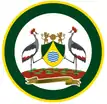Jomo Kenyatta International Airport
Jomo Kenyatta International Airport (IATA: NBO, ICAO: HKJK), is an international airport in Nairobi, the capital of and largest city in Kenya. The other two important international airports in Kenya include the Kisumu International Airport and Moi International Airport. Located in the Embakasi suburb 18 kilometres (11 mi) southeast of Nairobi's central business district, the airport has scheduled flights to destinations in over 50 countries.[3] Originally named Embakasi Airport, the airport's name was changed in 1978 to honor Jomo Kenyatta, Kenya's first president and prime minister. The airport served over 7 million passengers in 2016,[4] making it the seventh busiest airport in passenger traffic on the continent.[5]
Jomo Kenyatta International Airport Uwanja wa ndege wa Kimataifa wa Jomo Kenyatta | |||||||||||
|---|---|---|---|---|---|---|---|---|---|---|---|
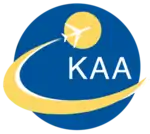 | |||||||||||
.jpg.webp) | |||||||||||
| Summary | |||||||||||
| Airport type | Joint (Civil and Military) | ||||||||||
| Operator | Kenya Airports Authority | ||||||||||
| Serves | Nairobi Metropolitan Region | ||||||||||
| Location | Embakasi, Nairobi, Kenya | ||||||||||
| Hub for | |||||||||||
| Elevation AMSL | 1,624 m / 5,330 ft | ||||||||||
| Coordinates | 01°19′07″S 36°55′33″E | ||||||||||
| Website | kaa | ||||||||||
| Map | |||||||||||
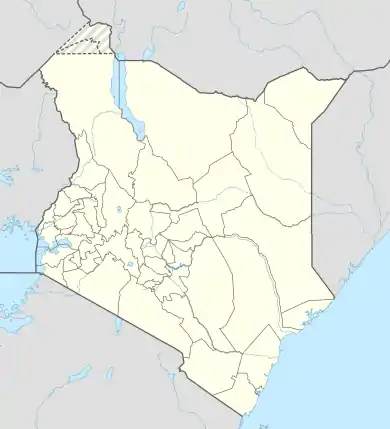 NBO Location within Kenya | |||||||||||
| Runways | |||||||||||
| |||||||||||
| Statistics (2020) | |||||||||||
| |||||||||||
Latitude and longitude provided by Kenya Airports Authority | |||||||||||
History
1950s and 1960s
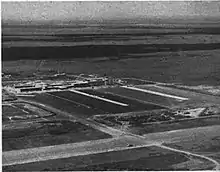
%252C_Kenya._The_lawn_of_the_airport_with_vans_-_Nairobi%252C_Kenya.jpg.webp)
Discussions about building the airport date back to 1945. At that time, the colonial power -- Britain -- and its national airline, BOAC, were worried that the existing airport at Eastleigh was inadequate for post-War civilian airliners. The costs of improving Eastleigh versus developing a new airport occupied planners for 8 years. Who would pay was a major issue.[6]
Plans for the airport were drawn up in 1953, work started in January 1954, and by mid-1957 it was found possible to bring the operational date forward to mid-March 1958. The task was by no means straightforward, and many problems —largely of a civil engineering nature—had to be overcome before the runway could be built. An extensive amount of the airport's construction was done utilizing forced labor, many of whom were Mau Mau rebels. Due to the enormous pressure to finish the airport and the high amount of labor necessary, it was not uncommon to work the laborers to the point where some of them died of exhaustion. The working conditions were so poor that were reports of suicides and self-mutilation among the laborers.[7] The site chosen, on a great lava plain, is a pilot's and a controller's dream: 18 kilometres (11 mi) from the centre of Nairobi (the city's two other airports, Eastleigh and Wilson, are closer), its approaches are free from any obstruction for at least 18 kilometres (11 mi) in any direction. The nearest mountain ("high ground" would be a misnomer when Embakasi itself is 1,624 metres (5,328 ft) AMSL) is 40 kilometres (25 mi) away, and 10 deg off the runway centre-line. Visibility rarely falls below this obstruction-distance in the clear air of the plains, and it may have been possible to see the summit of Mount Meru in Northern Tanzania, about 220 kilometres (140 mi) away; both Kilimanjaro 213 kilometres (132 mi) away and Mount Kenya could be clearly seen.
On Sunday 9 March 1958, Embakasi Airport (now JKIA) was opened by the last colonial governor of Kenya, Sir Evelyn Baring.[8] The airport was due to be opened by Queen Elizabeth The Queen Mother; however, she was delayed in Australia due to an engine failure on her Qantas Lockheed Super Constellation aircraft. Due to this, the Queen was unable to attend the ceremony.
The 3,048 metres (10,000 ft) runway at the then Embakasi Airport was a big improvement on Eastleigh's 2,432 metres (7,979 ft) murram runway, which in the rainy months was unsuitable for Britannias. The runway was 3,048 metres (10,000 ft) long between thresholds, and was sited roughly 06-24. The 06 approach was used on 90 per cent of the time. A basic strip 3,292 metres (10,801 ft) long and 152 metres (499 ft) wide was prepared for the 46 metres (151 ft) wide runway. There were 8 metres (26 ft) shoulders each side; and consequently 48 metres (157 ft) run-offs beyond the shoulders. After cambering, weak spots were reset, and finally paving machinery was used to lay the asphalt surface. The result was an engineering success of which the contractors were very proud; so accurate was the cambering that the wet surface of the runway dried out evenly on each side of the centre-line. Physically, the great care taken in the engineering resulted in a load classification number of 100 being achieved. The surface at the time was strong enough to accept the Boeing 707 at maximum gross weight, although 4,572 metres (15,000 ft) rather than 3,048 metres (10,000 ft) length was the probable all-weather length requirement. There was no physical limit to extending the paved length to this figure, but more definite plans for the operation of the big jets into Kenya was required before such an increase was contemplated.
At the time in 1958, Nairobi was one of the few towns in the world that could boast of a 1965 airport with an expansion option at hand. The number of aircraft movements then was less than 600 per month. The airport architect was strongly influenced by the design of Kloten, Zurich, in the planning and design of Embakasi, although similarities were by no means obvious. Both airports are arranged so that arrival passengers can see completely through the building; the minimum of signs is required. And although Embakasi was designed to meet Nairobi's particular needs, both airports shared a lightness and spaciousness that was at the time extraordinarily refreshing. The fitting and colour schemes employed at the then Embakasi Airport were first-class.[9]
1970s, 1980s and 1990s
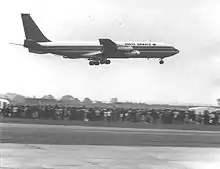
In 1972, the World Bank approved funds for further expansion of the airport, including a new international and domestic passenger terminal building, the airport's first dedicated cargo and freight terminal, new taxiways, associated aprons, internal roads, car parks, police and fire stations, a State Pavilion, airfield androadway lighting, fire hydrant system, water, electrical, telecommunications and sewage systems, a dual carriageway passenger access road, security, drainage and the building of the main access road to the airport (Airport South Road). The total cost of the project was over US$29 million (US$111.8 million in 2013 dollars).[10] On 14 March 1978, construction of the current terminal building was completed on the other side of the airport's single runway and opened by President Kenyatta.[11] The airport was again renamed, this time in honour of President Kenyatta after his death about five months later on 22 August 1978.
In October 1993, a British Airways Concorde landed at the airport for purposes of testing the aircraft's performance at high altitude.[12]
2000 - present
On 10 June 2008, Kenya Vision 2030 was launched by President Mwai Kibaki.[13] Under the vision, JKIA's aging infrastructure was to be upgraded to World Class standards. New Terminals and Runway were to be added in phases. The African Development Bank carried out an Environmental Impact Assessment on the development of Phase 1 of the proposed Green Field Terminal (GFT) which was expected to increase the capacity of JKIA to about 18.5 million passengers annually by the year 2030. The Greenfield Terminal project was to encompass the construction of a four level terminal building comprising a central processing area, a transit hotel, landside retail centers, arrivals and departures plaza. Ancillary facilities which would have included an access road, car parking, access taxiways, Ground Service Equipment (GSE) and bus parking areas.[14]
On 29 March 2016, the KES 56 billion (US$560 Million) Greenfield Terminal Project was terminated by Kenya Airports Authority because the contractor failed to secure funds thus ending Kenya's dream of having the largest terminal in Africa.[15] It however remains to be seen whether future administrations like the Grand Coalition Government of 2008-2013 will re-activate the project which is necessary for Nairobi and Kenya's future aviation needs in the 2020s, 2030s and beyond. It also remains to be seen whether the new KAA Managing director Johnny Andersen who was appointed in mid 2016 will have a vision for the airport beyond the 2030s.
In February 2017, the airport was awarded a Category One Status by the Federal Aviation Administration of the United States, thus allowing possible direct flights between the US and Nairobi. 5 other African countries have direct flights to the US (South Africa, Ethiopia, Egypt, Morocco, and Cabo Verde).[16][17] In April 2017, the US Department of Transportation granted Air Namibia a licence to fly to the US, making it the 6th African country to be permitted to operate this route.[16]
2013 fire
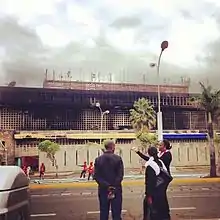
On 7 August 2013, a fire originating in the immigration area caused massive damage to the airport and forced it to suspend operations temporarily. Unit 3, usually dedicated to domestic operations, was used temporarily for international traffic.[18] The worst fire in the airport's history occurred on the fifteenth anniversary of the 1998 United States embassy bombings in Nairobi and Dar es Salaam, but no connection was immediately obvious and no terrorist group has claimed responsibility. The cause is not believed to be intentional, as no explosive devices were discovered during the initial investigation.[19][20] According to Kenyan officials, firefighting efforts were hampered by some of the first responders choosing to loot the airport instead of fighting the blaze.[21] International arrivals had been bused to a temporary facility set up in the ground floor of the new parkade until the reconstruction of the damaged areas. In June 2015, a new, fully functional temporary terminal building became operational. This terminal building was planned for a design life of 10 years, until completion of the planned new permanent facility.[22]
Facilities
Terminals
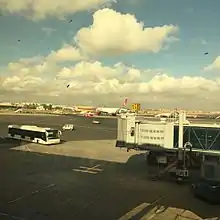
There are two terminals. Terminal 1 is arranged in a semi-circular orientation and is divided into four parts: 1A, 1B, 1C, and 1E are used for international arrivals and departures while terminal 1D is used for domestic departures and arrivals.[23] Terminal 2 is used by low-cost carriers. The original terminal, located on the north side of the runway, is used by the Kenya Air Force and is sometimes referred as Old Embakasi Airport.[24]
Figures from KAA indicate that the airport's Terminal 1-A has a capacity of 2.5 million passengers [25] The Kenyan government is targeting over 25 million passengers annually by 2025 on the expansion of JKIA's terminals.[24] In 2016, JKIA accounted for more than 70 per cent of overall passenger traffic in the country. It also had over 7 million passengers pass through it. Domestic travellers through the Jomo Kenyatta International Airport (JKIA) made up 40% cent of overall passengers in 2016. This is an increase from 32% five years prior (2012).[26]
Terminal 1A International Departures and Arrivals
Terminal 1A has a capacity of 2.5 million passengers a year and 3 levels, 30 check-in counters, 12 departure gates, ample seating and food & retail options. The Arrivals area houses 5 baggage carousels. This terminal is used primarily by Skyteam member airlines.
Terminal 1B International Departures
Terminal 1B houses common-use check-in counters, with security check points leading to the departure lounge on level 1. On level one is the Aspire lounge as well as duty-free shopping outlets and cafe's
Terminal 1C International Departures
This terminal houses common-use check-in counters, with security check points leading to the departure lounge on level 1. On level 1 are duty-free shops, Kenya Airways Simba Lounge and the Turkish Airlines Lounge and a cafe.
Terminal 1D Domestic Flights
Serves departing and arriving passengers on domestic flights. Occupied only Kenya Airways and its subsidiary, Jambojet.
Terminal 1E International Arrivals
Following the closure of the main International Arrivals and Departures terminal after a fire, a parking facility was converted into the temporary International Arrivals terminal.[27]
This terminal was subsequently opened to serve arriving passengers on airlines operating out of Terminals 1B and 1C.
NOTE: Remodeling & extending Terminals 1B, 1C & 1D is scheduled for 2017, after which JKIA is predicted to be able to handle 12M passengers.[28]
Terminal 2 Low-cost Carriers
Serves mainly low-cost carrier airlines (LCCs). The prefabricated terminal opened in April 2015 with a capacity of 2.5M passengers - originally intended to relieve overcrowding. Terminal 2 houses international & domestic check-in desks and boarding gates. Current lounges at Terminal 2 include the Mara Lounge and Mount Kenya Lounge - both at airside, Level 1 and open 24 hours.
Lounges
In January 2015, The Simba Lounge and Pride Lounge which are situated on the second floor of Terminal 1A were opened. The two facilities, with a combined capacity of 350 people, were developed at a cost of KES 135 million ($1.35 Million), and are for the use of KQ's Premier World and SkyTeam's Sky Priority passengers. There is also a Turkish Airlines TAV Lounge (T1B), as well as the Swissport Aspire Lounge (T1C). Both are regular lounges, which can be accessed by elite status or a paid-pass.
Second runway
In January 2017, a new instrument landing system-equipped runway 5,500 metres (18,000 ft) in length was approved for construction at a cost of KES 37 Billion shillings (approximately US$370 million).[29] According to KAA's managing director John Anderson, construction of the new runway which will be bigger than the existing one will begin this year (2017). It will also double aircraft movement from 25 to 45 per hour. The new runway will be a category 2 runway and will complement the older runway built in the 1970s. The proposed design of the project is a 4.8 kilometres long and 75 metre wide runway. The current runway is 60 metres wide and 4.2 kilometres long. This is an ICAO code F which can handle the new generation wide bodied aircraft like the Airbus A380 and the Boeing 747-8. The new runway will have fog lights, currently the present runway is only lit at the sides. The runway will also enable long haul flights to destinations like New York city carrying up to 32 tonnes of passengers and cargo.[30]
Airlines and destinations
Passenger
Cargo
Other facilities
- Amaica, a restaurant offering authentic Kenyan and African cuisine has its store in Terminal 1A Level 2.[43]
- American fast food chain Hardee's has an outlet at JKIA Terminal 1-A.
- African Express Airways has its head office on the airport property.[44]
- The Kenya Airports Authority also has its head office at the airport.[45]
DHL Express has its hub located in JKIA. The hub serves the whole of East Africa states
Ground transport
The main entrance to Jomo Kenyatta International Airport is on Airport South Road, which can be accessed by an exit from the A109 highway (Mombasa Road).
Passengers can also travel to and from the airport via city Bus Route Number 34
Taxi and Car rental services are well represented.
A link to the Nairobi Commuter Rail network has been proposed.
Accidents and incidents
- On 20 November 1974, Lufthansa Flight 540, a Lufthansa Boeing 747-130, D-ABYB, LH 540, "Hessen" (German state), delivered 1970, crashed on takeoff from runway 24 in Nairobi killing 59 of the 157 on board. The aircraft was on a flight from Frankfurt to Nairobi then Johannesburg. This was the first fatal accident and third hull loss of a Boeing 747.
- On 17 May 1989, a Boeing 707-330B operated by Somali Airlines aborted takeoff and then overran the wet runway and crashed into a rice field. The plane had 70 passengers and crew on board, but no fatalities resulted. The airplane was damaged beyond repair.[46]
- On 4 December 1990, a Boeing 707-321C freighter operated by Sudania Air Cargo struck an electricity pole 5 kilometres (3.1 mi) short of runway 06 and crashed in flames. Visibility was 500 metres (1,600 ft) in fog with a 30 metres (98 ft) cloud base. All 10 persons on board died. The airplane was damaged beyond repair.[47]
- On 6 June 2012, EgyptAir Flight 849, an Airbus A320, blew a tire while landing and veered off runway 06. Portions of the aircraft obstructed the runway, necessitating closure of the airport. Inbound flights were diverted to other airports in Kenya, Uganda and Tanzania. None of the 123 passengers and crew was injured.[48]
- On 4 January 2015, a Fokker 50 carrying 6 people crashed after a landing gear failure. Of the 6 on board, no injuries were reported. Jomo Kenyatta Airport was temporarily closed and all flights were diverted to Moi International Airport, Mombasa.[49]
References
- "Passenger and Cargo Traffic-April 2018". Archived from the original on 27 July 2018. Retrieved 28 July 2018.
- "JKIA's Contribution to economy" (PDF). Archived from the original (PDF) on 27 March 2018. Retrieved 5 May 2017.
- "Jomo Kenyatta, Nairobi (NBO) flight index". Archived from the original on 14 August 2011. Retrieved 7 August 2013.
- "JKIA passenger numbers hit record high". Archived from the original on 14 March 2017. Retrieved 5 May 2017.
- "AfroVisual Data "Africa's Top 10 Busiest Airports in 2016"". Retrieved 5 May 2017.
- Pirie, Gordon: "Nairobi's airports -- windows on Kenya's colonial past and top-down planning".
- Elkins, Caroline; "Britain's Gulag - The Brutal End of Empire in Kenya (2014), p. 187f; ISBN 978-1-847-92294-6"
- "Nairobi's New Airport" (PDF). Archived (PDF) from the original on 5 March 2016. Retrieved 7 August 2013.
- "Nairobi Airports". Archived from the original on 10 June 2015. Retrieved 4 June 2015.
- "Nairobi Airport Project". The World Bank. Archived from the original on 17 March 2014. Retrieved 7 August 2013.
- "Kenya Airport Authority concedes terminal 4 may not be ready until 2014". eTurboNews. 15 November 2012. Archived from the original on 14 May 2013. Retrieved 7 August 2013.
- "Concord landing in Nairobi Kenya Video". Retrieved 6 May 2017.
- "Kenya Vision 2030 JKIA". Archived from the original on 30 June 2017. Retrieved 6 May 2017.
- "Afdb JKIA Greenfield Terminal Environmental Impact Assessment" (PDF). Retrieved 6 May 2017.
- "Greenfield Terminal Project cancelled". Archived from the original on 9 June 2017. Retrieved 6 May 2017.
- Reporter, New Era Staff (22 May 2017). "Air Namibia granted right to fly into US". Archived from the original on 22 May 2017. Retrieved 30 May 2017.
- "JKIA achieves Category One Status". Archived from the original on 3 May 2017. Retrieved 6 May 2017.
- ""Kenya scrambles to limit economic fallout from massive airport fire", Los Angeles Times, reported by Nicholas Soi and Robyn Dixon, 7 August 2013". Archived from the original on 8 August 2013. Retrieved 7 August 2013.
- ""President Uhuru Kenyatta dismisses any acts of terrorism in Jomo Kenyatta International Airport fire," Standard Media, reported by PSCU, 9 August 2013". Archived from the original on 16 April 2015. Retrieved 7 April 2015.
- ""Fire guts Kenya's main airport, chokes regional gateway", Reuters, reported by Drazen Jorgic, 7 August 2013". Archived from the original on 24 September 2015. Retrieved 1 July 2017.
- "First responders looted Nairobi airport banks, shops while building burned", Associated Press, reported by Jason Straziuso and Tom Odula, published in The Globe and Mail, 8 August 2013
- ""Nairobi Airport Terminal Building", Röder HTS Höcker, accessed 17 September 2015". Archived from the original on 22 December 2015. Retrieved 17 September 2015.
- "Facts and Figures – Nairobi", Kenya Airports Authority, 9 December 2012 Archived 6 January 2014 at the Wayback Machine
- "JKIA Terminal expansion targets 25m Passengers". Archived from the original on 16 December 2016. Retrieved 5 May 2017.
- "JKIA's Terminal IA Arrivals Terminal to Commence Operations". 26 April 2016. Archived from the original on 11 December 2018. Retrieved 30 May 2017.
- "Passenger numbers hit record high". Archived from the original on 14 March 2017. Retrieved 5 May 2017.
- "Inferno roars through E. Africa's largest airport", Associated Press, reported by Jason Straziuso and Tom Odula, published in The Pueblo Chieftain, 7 August 2013
- "Nairobi Kenyatta International NBO Airport - Embacasi, Nairobi, Kenya". www.ifly.com. Archived from the original on 21 June 2017. Retrieved 30 May 2017.
- "New runway for Jomo Kenyatta International Airport after decades of waiting". www.constructionkenya.com. Archived from the original on 17 May 2017. Retrieved 30 May 2017.
- "JKIA New Runway". Archived from the original on 17 May 2017. Retrieved 5 May 2017.
- "China Southern adds Changsha – Nairobi service from late-June 2019". routesonline. Archived from the original on 29 April 2019. Retrieved 29 April 2019.
- 2017, UBM (UK) Ltd. "Kenya Airways ends Abuja / Gaborone service from Nov 2016". Archived from the original on 15 May 2017. Retrieved 30 May 2017.CS1 maint: numeric names: authors list (link)
- "Kenya Airways resumes Rome / Geneva service in June 2019". RoutesOnline. 22 January 2019. Archived from the original on 23 January 2019. Retrieved 22 January 2019.
- https://www.routesonline.com/news/38/airlineroute/292980/kenya-airways-plans-to-resume-guangzhou-service-from-mid-august-2020/
- "Archived copy". Archived from the original on 3 May 2019. Retrieved 3 May 2019.CS1 maint: archived copy as title (link)
- "Archived copy" (PDF). Archived (PDF) from the original on 15 February 2018. Retrieved 14 February 2018.CS1 maint: archived copy as title (link)
- "Kenya Airways Nov 2020 International Operations as of 19OCT20". Airlineroute. 20 October 2020. Retrieved 20 October 2020.
- "Kenya Airways moves Vic Fals launch". www.newzimbabwe.com. Archived from the original on 26 May 2017. Retrieved 30 May 2017.
- "Archived copy". Archived from the original on 20 July 2019. Retrieved 20 July 2019.CS1 maint: archived copy as title (link)
- 2017, UBM (UK) Ltd. "Malawian Airlines schedules new NS17 routes". Archived from the original on 2 February 2017. Retrieved 30 May 2017.CS1 maint: numeric names: authors list (link)
- "Oman Air plans Nairobi March 2017 launch". routesonline. Archived from the original on 14 December 2016. Retrieved 13 December 2016.
- "Istanbul New Airport Transition Delayed Until April 5, 2019 (At The Earliest)". Archived from the original on 27 February 2019. Retrieved 27 February 2019.
- "Amaica JKIA, Embakasi, Nairobi - Restaurant & Reviews". EatOut. Archived from the original on 7 August 2016. Retrieved 30 May 2017.
- "AFRICAN EXPRESS AIRWAYS CONTACTS", African Express Airways, accessed 13 August 2013 Archived 5 October 2013 at the Wayback Machine
- "Terms of Use Archived 12 October 2010 at the Wayback Machine." Kenya Airports Authority. Retrieved on 26 May 2011. "Kenya Airports Authority is a company registered in Kenya, whose registered office is at Jomo Kenyatta International Airport, Nairobi, Kenya.
- "Accident description, Aviation Safety Network, 17 May 1989". Archived from the original on 27 December 2013. Retrieved 10 August 2013.
- "Accident Description". Aviation Safety Network. Archived from the original on 17 March 2014. Retrieved 8 August 2013.
- "Kenya Reopens Nairobi Airport After EgyptAir Plane Removed". Bloomberg Businessweek. 6 June 2012. Retrieved 7 August 2013.
- Ranter, Harro. "ASN Aircraft accident Fokker 50 5Y-CET Nairobi-Jomo Kenyatta International Airport (NBO)". aviation-safety.net. Archived from the original on 24 April 2017. Retrieved 1 July 2017.
External links
![]() Media related to Jomo Kenyatta International Airport at Wikimedia Commons
Media related to Jomo Kenyatta International Airport at Wikimedia Commons
- Kenya Airports Authority – Jomo Kenyatta International Airport
- Airport information for HKJK at World Aero Data. Data current as of October 2006.
- Current weather for HKJK at NOAA/NWS
- Accident history for NBO at Aviation Safety Network
